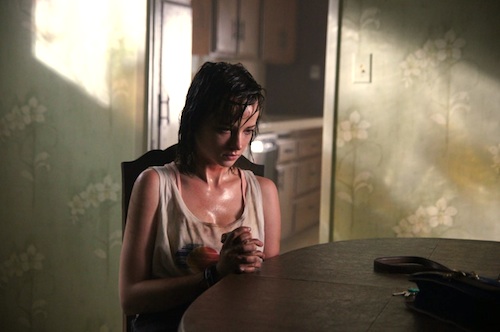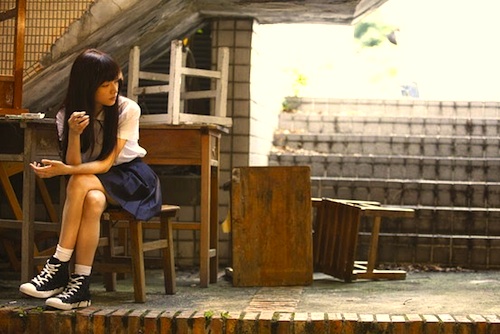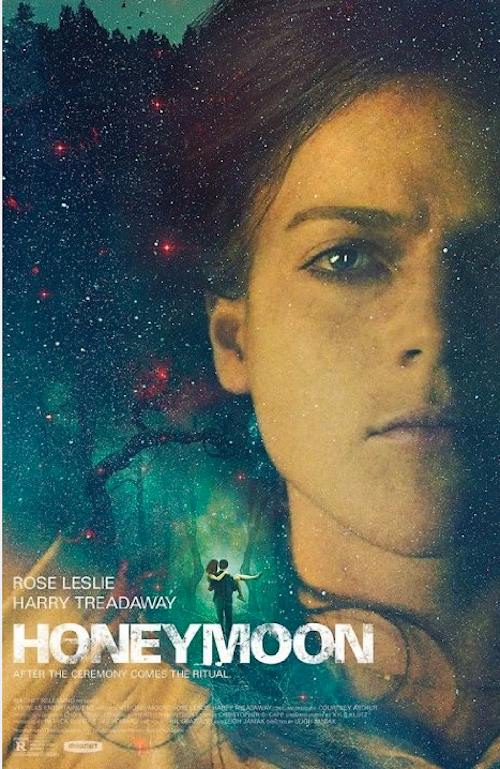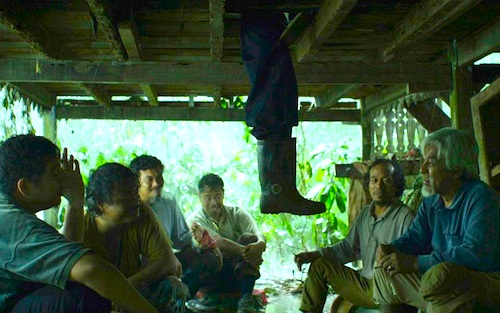By Joe Bendel. Kids today are dangerously ignorant of the blues. Nobody worth their Robert Johnson box-set would play along if a creepy Aryan cultist told them to walk down to the crossroads and say your name so the boss can find you later. She will do it for five bills, but she will not live to regret it in Nicholas McCarthy’s At the Devil’s Door, which opened last Friday in New York at the IFC Center.
A few years and a deep recession later, people would stand in line to sell their souls for pocket change. Nevertheless, Leigh, a go-getting real estate agent, is convinced she can sell her motivated clients’ house quickly, despite the state of the market. Teetering on the brink of foreclosure, they have also been dealing with their daughter Charlene’s behavioral issues. As Leigh pokes around the nearly empty domicile, she finds evidence of a fire, a twitchy young teen answering Charlene’s description, and wickedly bad vibes in every cupboard and closet, but she remains undeterred.
Frankly, Leigh’s hard-charging Tony Robbins self-help trips are a major reason why her depressive hipster artist sister artist Vera keeps her at arm’s length. However, when Leigh misses the opening of her latest show, she cannot help worrying. Inevitably, she will be drawn into the supernatural business as well.
There are individual sequences in Door that are chillingly effective, but you have to suspect McCarthy’s screenplay was substantially rewritten at several junctures. There are several thirty degree course corrections that are dramatic enough to interrupt the smooth narrative flow, but not wild enough to be jaw-dropping game-changers. At times, it feels like a horror movie built around alternating elements of haunted house and demonic possession films, drawn randomly out of a hat.
Still, McCarthy demonstrates a thorough command of mood and atmosphere, just as he did in The Pact. When the film stays in that house, it works just fine, but whenever it steps outside, it has a lot of explaining to do.

The sisters’ baton hand-off also looks like a mistake in retrospect. Catalina Sandino Moreno has had an interesting career after her Oscar nomination for Maria Full of Grace, appearing in Soderbergh’s Che on the left and then For Greater Glory on the right, followed by a dubious action turn in A Stranger in Paradise. Regardless, by genre standards, she is quite compelling as Leigh, the responsible sister, always trying please everyone else. Unfortunately, Naya Rivera (who was once on a short-lived show called something like Merriment or maybe Glee) lacks her energy and presence as the dull and dour Vera.
If you want to see horror movie, Door has enough elements, sufficiently executed, to satisfy a fan’s craving. McCarthy again puts some nice twists on familiar genre conventions, but he sort of loses the handle on his narrative. Maybe the next one will be his breakout. Recommended for fans of The Pact and those who want a demonic fix, At the Devil’s Door opened last week at the IFC Center and is also available via IFC Midnight’s VOD platforms.
LFM GRADE: C+
Posted on September 17th, 2014 at 9:59pm.




